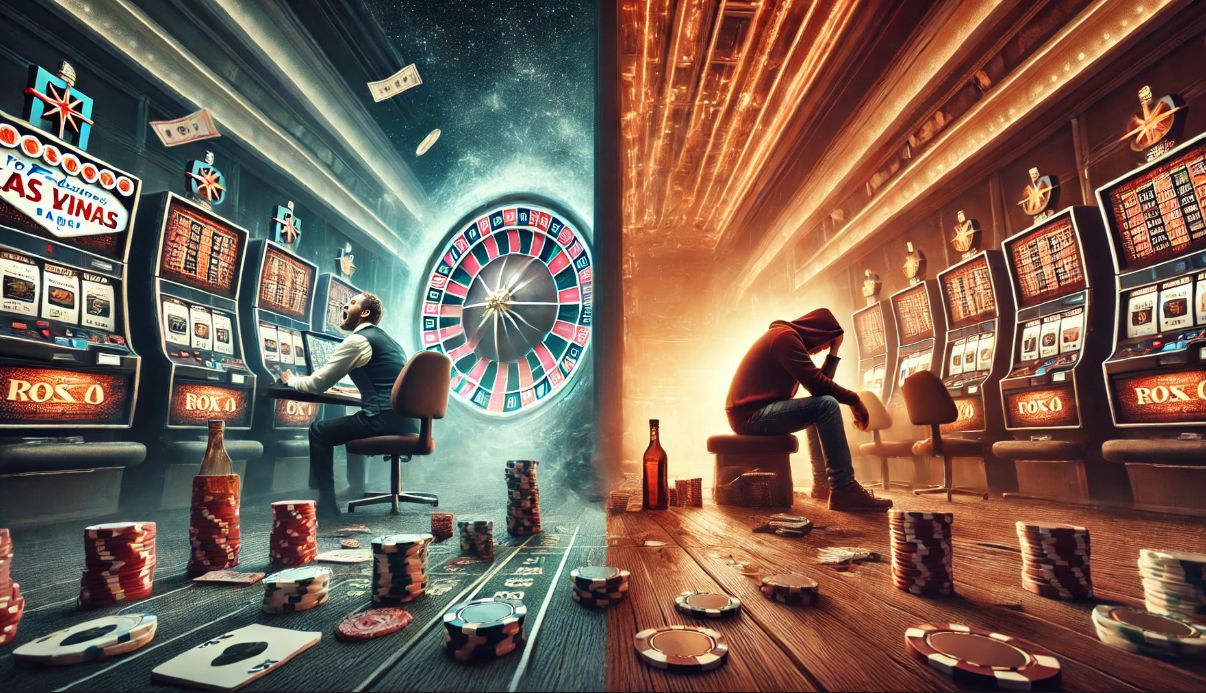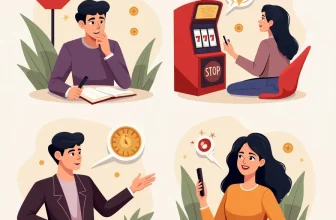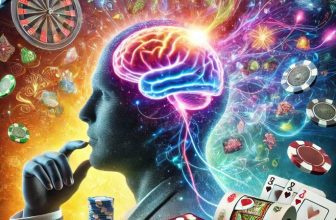We analyze the phenomenon of luck from a psychological point of view
In today's world of gambling, many people ask themselves: Why do some players leave casinos with profits, while others inevitably suffer losses? At first glance, it seems that everything comes down to pure luck. However, if you look more closely, it becomes clear that behind every win and loss there are not only mathematical calculations, but also a complex psychological mechanism. In this article, we will take a closer look at how mathematics and psychology interact in gambling, why some players demonstrate better results, and what role our thinking, emotions and personality traits play in this process.
Content
- We analyze the phenomenon of luck from a psychological point of view
- Introduction
- 1. The Mathematics of Gambling: The Foundation of Chance
- 2. Psychological factors influencing the outcome of the game
- 3. The Role of Positive Thinking and Beliefs in Gambling
- 4. Illusions and cognitive errors: psychological traps in gambling
- 5. Psychological preparation and self-regulation strategies
- 6. Combining Mathematics and Psychology: Why Some Players Win and Others Don't
- 7. Practical recommendations for responsible gaming
- 8. Scientific research and practical examples
- 9. Conclusion
- Frequently Asked Questions
- Results and recommendations
Introduction
Gambling have always aroused both admiration and bewilderment in people. On the one hand, we see how someone literally “catch luck by the tail” and wins a large sum, and on the other, we see how the same players, repeating their mistakes, lose almost everything. This dilemma is based on two interrelated aspects:
-
Mathematics of gambling. Probabilities, payout ratios, variance, and RTP (return to player) all demonstrate that gambling is inherently designed to give the casino an edge. Every slot machine, every bet, and every hand of poker is backed by strict mathematical laws.
-
Psychological component. Personality traits, emotional state, cognitive errors and strategies decision making – all of this affects how a player perceives a situation and what decisions they make during the game. Even if the outcome of a game is determined by chance, psychological attitude can significantly change the approach to the game and the attitude towards the outcome.
In this article, we will try to combine both of these areas to give a complete picture of how exactly psychological factors can contribute to success or, conversely, lead to failure in gambling.
1. The Mathematics of Gambling: The Foundation of Chance
1.1 Basics of Probability and Statistics
All gambling is based on mathematical principles. Casinos use probability models to ensure their advantage. An example is the concept of RTP (Return To Player) – this is a theoretically calculated percentage of winnings for the player. For example, if a slot has an RTP of 96%, this means that on average, for every 1000 rubles the bet will return 960 rubles. But it is important to understand that this indicator is calculated on a huge number of games and does not guarantee that a specific player will receive exactly this amount in one gaming session.
Besides RTP, key concepts are:
- Dispersion (volatility). This is a measure of the dispersion of winnings. A game with high variance may produce small wins for a long time and then suddenly give out big winFor some players, such volatility is a real challenge, for others it is a source of stress.
- Probability of an event. The odds of winning on a given round of play are often expressed as a fraction (e.g. 1 in 1,000,000 for the jackpot). Mathematically, the odds of winning are extremely small, and the casino always puts a margin on it to give it an edge in the long run.
1.2 Limitations of the mathematical model
Although mathematics gives an objective idea of probabilities, it is unable to take into account the psychological characteristics of the player. Mathematical calculations cannot predict how a person will react to a series of failures or victories, how fatigue, stress or overestimation of one's own capabilities will affect. This is where the game psychology – It helps us understand why even rational people make irrational decisions.
2. Psychological factors influencing the outcome of the game
2.1 Personality Traits and Cognitive Styles
The differences between players are often determined by their personality traits. Psychologists highlight several key aspects that can influence gambling:
- Impulsiveness. People with high levels of impulsivity tend to make decisions based on emotions, without thinking about long-term consequences. Such players are more likely to place bets in the hope of quickly hitting the jackpot, ignoring statistical risks.
- Self-control and discipline. The ability to control your emotions and follow a pre-planned strategy significantly increases your chances of playing successfully. Players with a high level of self-control are better able to cope with a series of failures and do not allow impulsive decisions to ruin their plan.
- Need for thrills. Some people gamble not so much for the sake of winning, but for the emotional thrill. This need may make them play longer and bet more, even when it is not rationally advisable.
- Level of optimism and belief in one's own luck. Positive thinking can influence the emotional state of a player, but at the same time it can lead to overconfidence. On the one hand, optimism helps to cope with failures, and on the other hand, it sometimes makes you overestimate your capabilities.
2.2 Cognitive distortions
One of the most interesting aspects of gambling psychology is cognitive biases – systematic errors in thinking that affect decision making. Here are some key examples:
- The illusion of control. Many players believe that they can influence the outcome of the game, although in reality the outcome is determined by chance. This illusion is especially evident in games with an element of chance, such as roulette.
- The "hot hand" effect. After a winning streak, players may mistakenly assume that their luck will continue and take more risks. stakes.
- The phenomenon of confirmation. People tend to remember only the successful cases, forgetting about the numerous failures. In this way, they create the illusion that luck is on their side.
- Recency effect. More recent events have a strong influence on the perception of probability, which can lead to incorrect predictions and decisions.
These cognitive errors, confirmed by numerous studies in the field of psychology, play a significant role in shaping the behavior of players. Even knowing the objective mathematical probabilities, a person tends to ignore them if his thinking is subject to such distortions.
2.3 Emotional reactions and stress
It is impossible to overestimate the influence of emotional state on the decision-making process. In gambling, emotions can be both an ally and an enemy:
- Stress and anxiety. Bad streaks, big bets and uncertainty of outcome can cause a lot of stress. When anxiety is high, people are more likely to make mistakes in an attempt to quickly compensate for losses.
- Emotional burnout. Prolonged exposure to heightened arousal and stress can lead to burnout, where the player becomes less attentive and begins to make decisions intuitively rather than analytically.
- Positive emotions. In turn, a positive attitude can help you cope with setbacks and maintain clarity of thought. However, too much optimism can lead to overconfidence and irrational risk-taking.
Professional psychologists recommend developing emotional intelligence and self-regulation skills to minimize the impact of negative emotions on the decision-making process in conditions of uncertainty.
3. The Role of Positive Thinking and Beliefs in Gambling
3.1 Positive Thinking: Possibilities and Limitations
It is often said that positive thinking can change your destiny. From a psychological perspective, belief in success and self-confidence can indeed play a positive role in managing emotions and stress. Here are some ways positive thinking can help in gambling:
- Reduce stress levels. Optimism helps a player stay calm even if a losing streak continues. The ability to see a situation in a more positive light helps reduce stress hormone levels, which allows for more informed decisions.
- Increasing self-efficacy. Belief in one's own abilities, backed by previous successes, helps the player focus on strategy rather than emotions. This is especially important in games where concentration and an analytical approach are important.
- Resisting cognitive biases. A clear understanding of one's own psychological weaknesses allows a player to adjust their strategies in a timely manner. For example, knowing about the "hot hand" phenomenon, a player can consciously reduce bets after a successful series in order not to succumb to the illusion of control.
3.2 Myths about the influence of thought on the outcome of the game
It is important to note that despite all the positive aspects of positive thinking, it cannot change the objective mathematical laws of gambling. The results of each game are determined by probabilities, and no amount of belief can change randomness. Research shows that self-confidence can help in risk management, but it does not affect the probability of a particular number or symbol appearing.
Thus, the psychological state and beliefs of the player can influence his ability to control emotions and make decisions, but cannot directly change the outcome of a random event. It is important to distinguish between the influence on the process of the game and on its outcome.
4. Illusions and cognitive errors: psychological traps in gambling
4.1 The illusion of control and its consequences
The illusion of control is one of the most studied phenomena in gambling psychology. It is the belief that a person can influence random processes if they put in enough effort or use a certain strategy. This view can lead to an overestimation of one’s own capabilities and, as a result, to making unjustifiably risky decisions.
Psychologically, this phenomenon is connected with the human need for order and predictability. In the conditions of uncertainty of gambling, the illusion of control creates a feeling of security, even if there are no objective grounds for such confidence.
4.2 Gambler's fallacy (player's error)
Another common cognitive bias is the so-called “gambler’s fallacy” or gambler error. The idea is that people mistakenly believe that past events influence future outcomes in independent random processes. For example, if a coin lands on heads several times in a row, many will believe that tails should land next. In fact, the probability remains unchanged.
This misconception often leads to misjudgment of risks and overconfidence that the outcome of the game can be predicted or that previous failures can be compensated for.
4.3 Confirmation and selective perception
Another important psychological mechanism is the confirmation effect, when a person remembers only those cases that match his expectations, ignoring all other statistics. If a player believes that he will be lucky, he will remember only winning moments, creating a false impression that luck is always on his side.
Selective perception also results in information that confirms an existing belief being perceived more strongly than information that contradicts it. This creates a vicious circle in which positive experiences reinforce confidence, while failures go unnoticed or are written off as temporary setbacks.

5. Psychological preparation and self-regulation strategies
5.1 Development of emotional intelligence
Emotional intelligence (EQ) – the ability to recognize, understand, and manage your emotions – is a key factor in successful decision-making, especially in situations of high uncertainty. Players with high EQ are able to:
- Assess the situation objectively and do not give in to immediate emotions;
- Recognize signs of emotional burnout and stress in a timely manner;
- Use relaxation techniques and breathing exercises to reduce tension during critical decision moments.
Professional psychologists recommend practicing mindfulness and meditation to improve self-control in gambling situations.
5.2 Cognitive Restructuring Techniques
Cognitive restructuring is a method of changing negative thought patterns that helps a gambler to see the situation objectively. Instead of focusing on a losing streak and experiencing panic fears, a person learns to view it as a statistical inevitability rather than a personal failure. Such techniques include:
- Analyzing and re-evaluating your own beliefs related to gambling;
- Formation of realistic expectations based on objective data and mathematical calculations;
- Constantly monitoring your own emotions and adjusting your behavior depending on the situation.
5.3 Developing a gaming strategy and bankroll management
Mental stability is closely related to having a clear strategy. Players who plan their actions in advance, set betting limits, and record the time of play show more stable results. Bankroll management – one of the most important elements of the strategy, allowing to minimize the risk of significant financial losses.
Bankroll management recommendations include:
- Setting clear financial limits for each gaming session;
- Planning rates based on objective criteria and mathematical calculations;
- Making a decision to stop playing when pre-set winning or losing limits are reached;
- Analyze the results after each gaming session to adjust your strategy.
5.4 Mindfulness Practice and Stress Management
Mindfulness is a technique that allows you to focus on the present moment and avoid overanalyzing past failures or future expectations. For a gambler, this means the ability to accept current circumstances without unnecessary emotional burden.
Stress management techniques include:
- Breathing exercises and short meditations between bets;
- Physical activity to relieve accumulated stress;
- Keeping a diary in which you record the emotions and thoughts that arise during the game, followed by analysis and finding ways to correct them.
6. Combining Mathematics and Psychology: Why Some Players Win and Others Don't
6.1 A systems approach to gambling
For success casino games It is important not only to know mathematics, but also to understand your own psychological characteristics. The result of a gambling game is not just the sum of the numbers that appear on the machine, but the result of a complex interaction of objective mathematical laws and subjective psychological factors.
Successful players are often those who have managed to develop a systematic approach:
- Probability analysis and risk calculation. Understanding statistics and objectively perceiving probabilities helps avoid emotional decisions.
- Effective management of emotions. Being aware of your own psychological triggers can help you minimize the impact of stress and impulsivity.
- Continuous learning and self-analysis. Players who are willing to analyze their successes and failures are quicker to identify their own weaknesses and work to eliminate them.
6.2 Psychological resilience as a key to success
Looking at the phenomenon of luck from a psychological perspective, we can conclude that winning and losing in gambling often depends on how well a player can manage his or her internal state. Here are some aspects that support this statement:
- Ability to adapt. A player who can quickly adapt to changing situations is able to adjust his strategy depending on current circumstances.
- Self-regulation. Self-control and emotional regulation skills allow you to maintain clarity of thought even in conditions of high uncertainty.
- Abandonment of illusions. Recognizing that randomness plays a critical role helps avoid the mistakes of overconfidence or the illusion of control.
6.3 Influence of external factors
In addition to internal psychological characteristics, external factors can also influence gambling results:
- Social environment. The opinions of others, advertising, success stories of famous players - all this can create additional pressure or, on the contrary, support confidence.
- Cultural attitudes. Attitudes toward gambling can vary greatly across cultures, which affects how players perceive luck and risk.
- Economic situation. Financial stability or its absence can influence the psychology of a player: some see the game as a way to earn extra money, others – as a risk of losing the funds they already have.
7. Practical recommendations for responsible gaming
7.1 Understanding the Reality of Gambling
The first step to becoming a successful gambler is to recognize the objective reality that gambling is designed in such a way that in the long run the house always has the advantage. This awareness helps to avoid the illusion that you can “beat” the system with just your mind or a special strategy.
7.2 Forming Realistic Expectations
It is important for the player to understand that even with high levels of self-control and psychological stability, chance remains the main factor. Realistic expectations help not to be disappointed by temporary failures and accept them as an integral part of the game.
7.3 Developing an individual plan
Anyone who decides to gamble should develop an individual plan:
- Defining limits. Set a maximum amount you are willing to lose and do not exceed that limit.
- Planning your play time. Clearly define the time you are willing to devote to the game to avoid getting sucked into endless sessions.
- Analysis of results. Keep track of your wins and losses, analyze which decisions lead to positive results and which ones lead to mistakes.
7.4 Support and assistance
If you notice that gambling is starting to negatively affect your emotional state, financial situation or social relationships, do not hesitate to seek professional help. There are specialized psychologists and consultants who can help you develop a strategy to get out of addictive behavior and regain control over your life.
8. Scientific research and practical examples
8.1 Results of empirical research
Numerous studies confirm that personality traits play a crucial role in gambling. For example, neuropsychological research shows that activity in the areas of the brain responsible for impulse control correlates with gamblers’ success in conditions of high uncertainty. Other studies point to a link between emotional intelligence and gamblers’ ability to make rational decisions even under stress.
8.2 Examples from practice
Professional players and athletes participating in tournaments often turn to psychologists to prepare for competitions. Their experience shows that successful performance depends not only on technical skills, but also on the ability to control emotions and react correctly to stressful situations. Similar practices are also used in gambling, where the ability to maintain concentration and avoid impulsive decisions is often a decisive factor.
8.3 Interviews with experts
Psychology experts point out that many gambling problems are rooted in a lack of self-analysis and understanding of one's internal mechanisms. Professional psychologists advise players to regularly conduct self-assessments, analyze their mistakes, and work on developing emotional regulation skills. This approach not only improves gaming results, but also maintains mental health.
9. Conclusion
In summary, it can be argued that the phenomenon of luck in gambling is a complex interaction of objective mathematical laws and subjective psychological processes. On the one hand, mathematics dictates probabilities and the inevitability of dispersion, and on the other hand, the human brain, with its emotions, beliefs and cognitive distortions, can both contribute to successful play and lead to its failures.
The main conclusions can be summarized as follows:
- Mathematical basis. Every casino game is subject to strict statistical rules. Probabilities, RTP and variance are objective parameters that cannot be changed by the power of thought.
- Psychological factor. Personality traits, level of self-control, emotional state and cognitive biases play a decisive role in how a player perceives risk and makes decisions.
- Positive thinking. Self-confidence and a positive attitude can help you manage your emotions, but they do not directly affect your mathematical chances of winning.
- The need for a strategic approach. Only a combination of objective analysis, a clearly defined strategy and psychological stability can minimize risks and increase the chances of a successful game.
For those who choose gambling as a form of entertainment, it is important to remember that success depends not only on chance, but also on the ability to properly manage your thoughts and emotions. Understanding your psychological characteristics, recognizing the risks and using self-regulation methods can make the gaming process more controllable and, perhaps, even enjoyable.
No matter how professional you are in managing your emotions, there is always an element of chance that cannot be eliminated from the game. Therefore, it is important to play responsibly, not to bet more than you can afford to lose, and to seek help from specialists if necessary.
Frequently Asked Questions
Question 1: Can positive thinking change the mathematical odds in a game?
Positive thinking helps manage emotions and reduce stress, but it does not affect objective probabilities. The outcome of the game is determined by mathematical laws, not by the strength of beliefs.
Question 2: What personality traits contribute to successful gaming?
Important qualities include a high level of self-control, discipline, the ability to analyze rationally, and the ability to cope with stress. People who are aware of their cognitive distortions and work to overcome them tend to perform better.
Question 3: What methods help reduce the impact of stress during gaming?
Mindfulness practices, breathing exercises, meditation, and emotional journaling can help manage stress levels. Also, developing a clear strategy and keeping limits can help reduce pressure in critical moments.
Question 4: Is it possible to “beat” the casino using psychological methods?
In the long run, the casino always has a mathematical advantage. However, proper emotional management and the right strategy can help a player avoid reckless bets and minimize losses in the short term.
Question 5: What are the most common cognitive errors among gamblers?
The most common are the illusion of control, the hot hand effect, the gambler's fallacy (underestimating the probability of independent events), and the confirmation effect. Being aware of these errors and working with them through cognitive restructuring will help you make more objective decisions.
Results and recommendations
Combining objective mathematical analysis with a deep understanding of the psychological processes that occur in the player's mind is the key to making gambling not just a source of emotions, but a controlled process in which risk and pleasure are in balance. If you want to improve your gambling performance, pay attention to the following recommendations:
- Learn the math of the game. Understanding probabilities, RTP and variance will help you assess risks objectively.
- Work on emotional stability. Learn stress management techniques, practice mindfulness and cognitive restructuring.
- Set clear limits. Set your maximum bet amounts and playing time to avoid impulsive decisions.
- Analyze the results. Keep track of your winning and losing sessions to identify weaknesses and adjust your strategy.
- Don't forget about reality. Accept the fact that gambling is inherently random and no amount of psychological techniques can change the objective mathematical laws.
- Contact us for support. If you feel like gambling is starting to negatively impact your life, don't hesitate to contact a psychologist or a specialist in combating gambling addiction.
In conclusion, I would like to note that successful gambling is the result of not only luck, but also a deep understanding of oneself, the ability to analyze one's emotions and make rational decisions. The psychology of gambling shows that victories and defeats go hand in hand, and only those who have learned to manage their inner state can find a balance between excitement and reason.
Remember that gambling should remain a form of entertainment, not a way to earn money. A conscious attitude to risk, discipline, and self-regulation are the best allies on this path. And even if luck does not always smile on you, you can always learn from each gaming experience, developing your personal and professional skills.
This article demonstrates that behind the apparent simplicity of random wins and losses lies a complex system of interaction between mathematics and psychology. Only through a deep analysis of one’s own beliefs, emotions, and strategies can one learn not only to control the game, but also to maintain mental health in conditions of constant risk. We hope that the principles outlined here will help you make your approach to gambling more conscious and responsible.
Let your understanding of mathematics and psychology be your best tool for self-knowledge and development, no matter how passionate you are about gambling. Good luck in all your endeavors – both in the game and in life!




